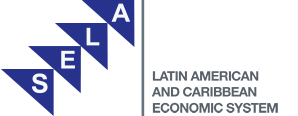WHAT IS SELA?
The Latin American and Caribbean Economic System (SELA) is a intergovernmental regional organization that groups 26 Latin American and Caribbean countries. With headquarters in Caracas, Venezuela, SELA was established on 17 October 1975 by the Panama Convention and its current membership includes Argentina, Bahamas, Barbados, Belize, Bolivia, Brazil, Colombia, Cuba, Chile, Ecuador, El Salvador, Guatemala, Guyana, Haiti, Honduras, Jamaica, Mexico, Nicaragua, Panama, Paraguay, Peru, Dominican Republic, Suriname, Trinidad & Tobago, Uruguay and Venezuela.
SELA is primarily aimed at promoting a system of consultation and coordination for the Latin American and Caribbean region to adopt common positions and strategies on economic issues before countries, groups of countries, forums and international organizations, and at fostering cooperation and integration among Latin American and Caribbean nations.
At its XXXI Regular Meeting (21 to 23 November 2005), the Latin American Council, the highest decision-making body of SELA, agreed, by Decision 473, that “the terms ‘Latin America’ and ‘Latin American’, as used in the Panama Convention establishing the ‘Latin American Economic System’ should be interpreted as meaning ‘Latin America and the Caribbean’ and ‘Latin American and Caribbean’, respectively, and that, consequently, the name of the organization should be understood as meaning ‘Latin American and Caribbean Economic System”.
Institutional Documents
- Panama Convention Establishing the Latin American Economic System (SELA)
- Law Approving the Headquarters Agreement between the Government of the Republic of Venezuela and the Latin American Economic System (SELA)
- Arrangement to Improve the Provisions of the SELA Agreement
- Regulations of the Latin American Council
- Regulations of the Actions Committees
- Regulations of the Permanent Secretariat
- Observer Regulations






